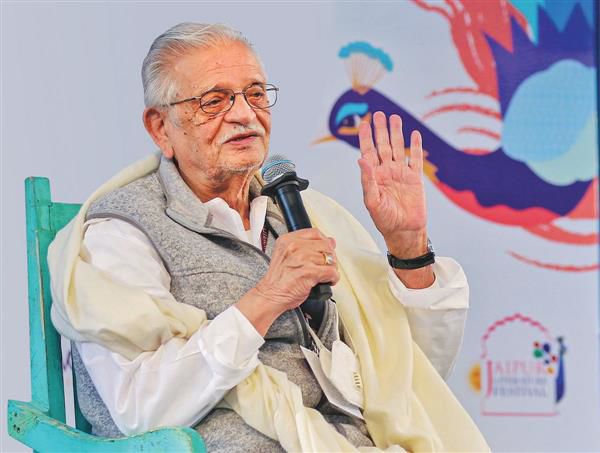
Sampooran Singh Kalra, popularly known as Gulzar, 89, is considered one of the finest poets of the era. PTI
Surinder Deol
Most people are familiar with the captivating film lyrics of Gulzar going back to the 1960s. Still, since he keeps his literary life separate from his film life, his poems and ghazals get less attention unless you’re a Gulzar aficionado. Good news for that select group: Gulzar has been awarded the prestigious Jnanpith Award for 2023.
Gulzar started as an Urdu poet, which he still is, but his range extends to Hindi, Bengali, Bhojpuri, several Indian and Pakistani dialects, and even Sanskrit
All poets are great innovators. If you can’t think in new ways, you can’t create poetry. The titles of Gulzar’s poems (‘Waqt’, ‘Khuda’, ‘Aansu’, ‘Dariya’, ‘Painting’, ‘Baadal’, ‘Raat’, ‘Sketch’, ‘Guftgu’, ‘Post-Box’, etc) seem so ordinary. What can you infer? Gulzar’s innovation lies in looking at places, things and people with a new vision, a new interpretation, through an array of words that make us think differently. He takes us on a journey to places we had not thought of going, and we come back wondering why we didn’t think of that. This is at the heart of Gulzar’s poetic ability, which shines brightly when he picks up his pen.
His poem ‘Dastak’ resonates with a haunting potency, leaving an indelible mark on those who encounter it. The short poem unfolds against a dream disturbed by the tapping at the door by unseen visitors from across the border in the dead of night. Welcoming them inside, the poet extends the timeless gesture of Punjabi hospitality, a testament to the enduring bonds of camaraderie that transcend borders. In the hands of the guests lies a gift steeped in symbolism: gur, harvested from the bountiful crops of bygone years. Here, the jaggery serves as a poignant metaphor for the cherished friendships before the tumult of Partition and the scars of conflict severed ties. Yet, even as the poet basks in the sweetness of reunion, reality intrudes with chilling abruptness. The dream shatters like glass as the news of gunfire at the border pierces the tranquillity of the night.
Dastak
Subah subah ik khwaab ki dastak par
darwaza khola, dekha
sarhad ke us paar se kuchh mehman aae haiñ
añkhoñ se manus the saare
chehre saare sune sunae
paañv dhoye, haath dhulae
añgan meñ aasan lagvae...
aur tannur pe makki ke kuchh mote mote rot pakae
potli meñ mehman mere
pichhle saloñ ki fasloñ ka gur laae the
Aañkh khuli to dekha ghar meñ koi nahiñ tha
haath laga kar dekha to tannur abhi tak bujha nahiñ tha
aur hoñtoñ par mithe gur ka zaiqa ab tak chipak raha tha
Khwaab tha shayad! khwaab hi hoga!!
Sarhad par kal raat, suna hai, chali thi goli
sarhad par kal raat, suna hai
kuchh khwaaboñ ka khuun hua thaa!
Tapping
Early one morning, upon the tapping of
a dream, I opened the door and saw
Some guests had come from across the border
They seemed familiar
Their faces known and read
I washed their faces, and their feet
And had seats laid out in the courtyard
Chunky corn bread was cooked in the tandoor
Wrapped in little bundles my guests had brought
Gur from last season’s harvest
I woke up and saw there was no one in the house
I touched the tandoor and found it was still warm
And my lips were still sticky with the sweet taste of the gur
Perhaps it was a dream! Yes, it must be a dream!
Last night, they say, shots rang out at the border
Last night, they say
Some dreams were killed at the border.
In this jarring juxtaposition of hospitality and violence, the poem navigates the delicate balance between hope and despair, between the fragility of dreams and the harshness of reality. Sensory details dance across the narrative, infusing it with a palpable realism. The taste of gur lingers on the lips, a bittersweet reminder of fleeting moments of joy amidst the chaos of existence. Throughout the poem, the refrain echoes like a mournful lament: ‘Khwaab tha shayad, khwaab hi hoga’ (Perhaps it was a dream! Yes, it must be a dream!). It is a haunting refrain that reverberates with uncertainty and disbelief, capturing the poet’s struggle to reconcile the ephemeral nature of dreams with the harshness of truth.
Gulzar was a young lad at the time of Partition. He has pleasant memories of his childhood in Dina, his place of birth (now in Pakistan), but the apocalyptic experiences and harrowing scenes of barbarity in 1947 scarred Gulzar’s psyche. The echoes of that tragic event recur in his prose and poetry.
Because Gulzar is essentially an Urdu poet, the adulation he receives from his Pakistani readers is no less. He affectionately called the late Ahmad Nadim Qasmi, a short story writer and poet from Pakistan, ‘Baba’ for the guidance and encouragement he received from him.
Gulzar loves languages. He started as an Urdu poet, which he still is, but his range extends to Hindi, Bengali, Bhojpuri, several Indian and Pakistani dialects, and even Sanskrit. He may start a poem in Urdu, but ornamentations may come from several languages. His poem ‘Urdu Zabaan’ stands as a testament to the exquisite allure of the Urdu language — a single page adorned with verses that praise its richness and splendour. Like the wafting fragrance of expensive qimam upon a betel leaf, speaking Urdu is described as an intoxicating experience — a sensation that envelops the senses and leaves one spellbound. Within the intricate tapestry of Urdu, the poet discerns an aura of aristocratic elegance — a noble dignity that transcends words, even when their meanings may elude understanding. It is a language steeped in history and tradition, bearing the weight of centuries past, yet ever vibrant and alive.
Through the lens of Urdu poetry, the poem delves into the profound impact this language can have on the human soul. It is not merely a mode of communication but a vessel for cultural identity and belonging — a thread that binds individuals across diverse backgrounds and origins. In its structure, the poem flows with fluidity, mirroring the graceful cadence of Urdu itself. The refrain, ‘Ye kaisa ishq hai Urdu zabaan ka?’ (What kind of love is this for the Urdu language?), recurs. Indeed, the rarity of such a tribute within Urdu poetry sparks reflection. How many Urdu poets have penned odes to the very language they write in? The answer is elusive — maybe a few, maybe none.
Let us talk about two short poems: ‘Ruuh Dekhi Hai Kabhi!’ and ‘Landscape’. Though not inherently mystical, Gulzar occasionally evokes echoes of Rumi, Hafiz or Bulleh Shah. ‘Ruuh’ delves into the depths of the human spirit, posing profound inquiries about the essence of the soul and its elusive nature. It challenges readers to confront their perceptions of existence and probe whether they have ever truly felt the intangible facets of life. The poet treads a delicate path, urging readers to peer into the recesses of their being — a journey fraught with uncertainty and risk. The refrain, ‘Ruuh dekhi hai, kabhi ruuh ko mehsoos kiya hai?’ (Have you ever seen the soul? Have you ever felt it?), encapsulates the central theme, beckoning readers to engage in introspective dialogue. With vivid imagery, Gulzar paints a tapestry of sensations that envelop the reader, drawing them deeper into contemplation. Yet, this task has its challenges. The poet grapples with the daunting endeavour of rousing slumbering minds from their existential stupor. In a world where spiritual guides or religious preachers often view their roles as mere recruiters to faith, Gulzar stands as a solitary figure, wielding his words as awakening tools.
Ruuh Dekhi Hai Kabhi!
Ruuh dekhi hai?
kabhi ruuh ko mahsus kiya hai?
jagte jiite hue dudhiya kohre se lipat kar
saañs lete hue us kohre ko mahsus kiya hai?
Ya shikare meñ kisi jhiil pe jab raat basar ho
aur paani ke chhpakoñ meñ
baja karti hoñ talliañ
subkiyañ leti hawaoñ ke
wo bain sune haiñ?
Chaudhviñ-rat ke barfab se ik chañd ko jab
dher se saae pakadne ke liye bhagte haiñ
tumne sahil pe khade girje ki diwar se lag kar
apni gahnati hui kokh ko mahsus kiya hai?
Jism sau baar jale fir wahi mitti ka dhela
ruuh ik baar jalegi to wo kundan hogi
Ruuh dekhi hai, kabhi ruuh ko mahsus kiya hai?
Romanised transcription courtesy rekhta foundation
Have You Ever Seen the Soul?
Have you ever seen the soul? Have you ever felt it?
Wrapped with the waking, living, milky mist
Have you ever felt this breathing mist?
Or when spending a night on a houseboat on some lake
And when the sound of the bells is
heard in the splashing of water
Have you heard the weeping of the sobbing wind?
On a full moon night
When scores of shadows run to catch the icy moon
Standing on the shore, propped up
against the church wall
Have you ever felt your eclipsed womb?
Burnt a hundred times, the body is still a lump of clay
Burnt once the soul becomes pure gold
Have you ever seen the soul? Or felt it?
— From ‘Baal-O-Par’.
Excerpted with permission from HarperCollins
In ‘Landscape’, at the vast expanse of a desolate shoreline, a poignant scene unfolds — an aged palm tree stands weathered by time while a youthful counterpart thrives with vitality. The contrast mirrors the stark duality of life itself: one laden with the weight of years, the other brimming with the promise of tomorrow. Amidst the haunting silence of their surroundings, the elder tree, burdened by solitude, yearns for the warmth of companionship. Its weathered form speaks volumes of unspoken longing. Personified, the ancient palm tree becomes a vessel for human emotion, its silent plea for conversation resonating with the reader’s yearning for connection. As the poem climaxes, the elder tree implores its youthful counterpart: ‘Yaar! Sard sannaata hai! Tanhaaii hai! Kuchh baat karo!’ (Friend, it is so cold, silent, and desolate! Say something!)
In these words, we confront a universal truth — a moment of vulnerability where words fail, and the weight of silence hangs heavy in the air. It reflects our own experiences, where the pause in conversation leaves us grasping for words to bridge the gap and dispel the uneasy stillness. Even as the poem concludes, the lingering question remains — an invitation to introspection, to consider the countless moments in our lives where conversation falters, and we are left to navigate the silence. In this poignant portrayal of longing and connection, we find echoes of our humanity, reminding us of the enduring power of words to mend the broken threads of silence and forge bonds that transcend the passage of time.
Innovation mainly symbolises Gulzar’s creativity. He has created a poetic form called Triveni (a three-line poem). No, it is not to be confused with Haiku. Gulzar explains the metaphorical foundation of this technique. Imagine the sangam where Yamuna, Ganga and Saraswati meet. The two rivers are visible, and the third is hidden underneath. The third line of Triveni is the reaction of the hidden Saraswati, for which any guesswork is meaningless. This line may be an explanatory comment that clarifies the previous two lines’ meaning or adds something new. In reality, we are awakened to a voice with no face, but its presence is felt all around. It is the voice of wholeness that we often miss in our lives.
The Jnanpith Award comes a few weeks after Gulzar published ‘Baal-O-Par’ — over 1,200 pages of 650 poems both in original Urdu (but transcribed in Devanagari for convenience) and translated into English by Rakhshanda Jalil. Gulzar easily translates at one level because he uses clear and simple language. Yet, capturing the mithaas (the sweetness) of his Hindi, Urdu and Punjabi words is not easy. The poet examined the translator’s output line by line, word by word. As a result, each translated poem looks like the poet’s original work, a significant achievement.
To call it ‘collected poems’ suggests a completeness, an encapsulation of the poet’s essence. Yet, can a poet’s work ever be contained in one place? Can it ever be considered finished, even after the poet has departed from this world? Consider Ghalib, whose ghazals continued to surface a century after his passing, revealing layers of his artistry that were previously unknown. His words resonate through time, echoing in the hearts of those who read them. We are not merely reading Ghalib but engaging in a timeless dialogue with him — a conversation that transcends generations. The same holds true for Gulzar, whose verses are a ceaseless stream of consciousness, flowing effortlessly through the corridors of our minds. He speaks, and we listen, enraptured by the beauty of his words. There is sheer joy in suspending our judgment while quietly listening to the poet’s voice.
— The writer is an author and a literary translator
Join Whatsapp Channel of The Tribune for latest updates.



























